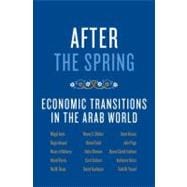
Note: Supplemental materials are not guaranteed with Rental or Used book purchases.
Purchase Benefits
What is included with this book?
| Preface | p. vii |
| Introduction | p. 1 |
| Remaking the Arab Economies | p. 2 |
| What Kind of Reform? | p. 10 |
| New Transitions, New Directions: Outline of the Volume | p. 17 |
| What Next? Stability, Confidence, and Credibility | p. 26 |
| The Origins of the Arab Spring | p. 31 |
| The Unraveling Arab Social Contract | p. 32 |
| The Legacy of the Arab Polity | p. 40 |
| Partial Reform and International Experiences | p. 44 |
| Myths and Realities in Transition | p. 50 |
| Opportunities for Young People | p. 54 |
| Basic Demographic Trends | p. 55 |
| Employment: Young and Waiting | p. 56 |
| Education: Right Intentions, Wrong Outcomes | p. 60 |
| Transition Challenge: Evening out the Burden of Adjustment | p. 70 |
| Building a Modern State | p. 80 |
| Fiscal Reform | p. 81 |
| Public Sector Employment | p. 91 |
| Getting Good Government | p. 96 |
| Transforming the Private Sector | p. 106 |
| A Structural Deficit in the Non-Oil Sector | p. 108 |
| Can the Arab World Compete? | p. 124 |
| Moving Forward with Private Sector Reform | p. 126 |
| Strategic Choices in Private Sector Reform | p. 131 |
| New Regional and Global Strategies | p. 140 |
| Integrating with the Region and the World | p. 142 |
| Regional Infrastructure Cooperation | p. 151 |
| A Role for International Actors? | p. 155 |
| Index | p. 175 |
| Table of Contents provided by Ingram. All Rights Reserved. |
The New copy of this book will include any supplemental materials advertised. Please check the title of the book to determine if it should include any access cards, study guides, lab manuals, CDs, etc.
The Used, Rental and eBook copies of this book are not guaranteed to include any supplemental materials. Typically, only the book itself is included. This is true even if the title states it includes any access cards, study guides, lab manuals, CDs, etc.